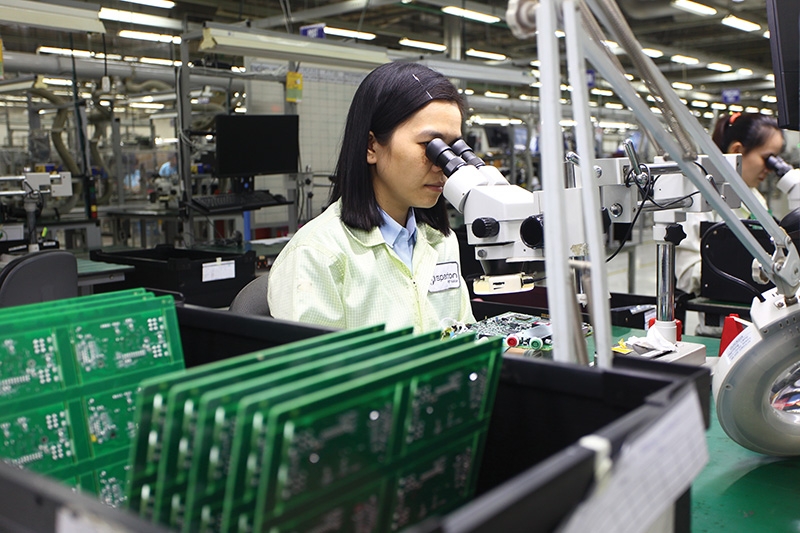Crucial foreign groups attempt to stabilise business activities
 |
| Many large manufacturers have been dealing with a shortage of wokers due to travel restrictions. Photo: Le Toan |
Japanese-backed Brother Vietnam Co., Ltd. has suspended operations at its manufacturing plant in Tan Truong Industrial Zone (IZ) in the northern province of Hai Duong for one year starting this month.
The plant, representing the total investment of $73 million, has been making industrial sewing machines and accessories for the textile and apparel industry.
“COVID-19 has dealt a strong blow to the industry. We have to temporarily cease operations as the demand has abated,” a company representative told the media.
In the immediate future, the company’s manufacturing plant in China will take over fulfilling orders. The representative also noted that before suspending operations, the company has fulfilled all welfare benefits for its 300 employees.
Meanwhile, Brother Industries Co., Ltd., which produces and trades in printers, fax machines, and electric equipment, reported unclear prospects in some areas. With five operating plants in Hai Duong worth $180 million in total, one of which was inaugurated at the beginning of this year, Brother Industries has successfully maintained stable operations.
However, a company representative unveiled that they are facing a critical shortage of workers. “Our plants are using a huge number of workers from the nearby provinces of Bac Ninh and Bac Giang, which were the epicentres of COVID-19 outbreaks a few months ago,” the source said.
Brother Industries’ five plants employ 12,000 labourers. The company has requested support from the province to deal with the shortage of hands but the situation has not improved.
Meanwhile, US-backed Cargill Vietnam has been facing multiple hardships as COVID-19 is plaguing localities in southern Vietnam where many of its animal feed production facilities are located. While receiving tailwind from increasing market demand, the company has been facing sharply-rising input costs in the past few months.
According to John Fering, regional managing director of Cargill Animal Nutrition South East Asia, soaring input costs are a challenge shared by the global industry. This is driving up animal feed prices, impacting the margins of farmers.
Foreign-invested enterprises (FIEs) in Bac Giang have gradually stabilised production since the worst outbreaks there began to be controlled.
So far, 263 businesses based in the province’s IZs with nearly 78,000 workers have resumed operations. Many enterprises have welcomed back workers in droves. For instance, more than 17,200 employees have returned to work at Foxconn, nearly 15,000 at Luxshare, and more than 4,000 at Crystal Martin. Labour shortages, however, remain the greatest concern for other manufacturers.
FIEs in the province’s IZs, including Luxshare, Newwing, and Lens Vietnam, are also looking to recruit 42,000 workers as many of their labourers still cannot return to work.
As soon as such FIEs based in northern locations have gradually stabilised business, those in southern locations, particularly in Ho Chi Minh City, were hit next. Over 33,000 workers at Taiwan-backed PouYuen Vietnam in Ho Chi Minh City had to suspend work. Of those, nearly 10,000 people from the southern province of Long An could not return due to travel restrictions put in place by Ho Chi Minh City authorities. In Tien Giang and Ben Tre provinces in the Mekong Delta, more than 3,500 workers of PouYuen Vietnam faced similar difficulties.
What the stars mean:
★ Poor ★ ★ Promising ★★★ Good ★★★★ Very good ★★★★★ Exceptional
 Tag:
Tag:
Themes: COVID-19
- 67 million children missed out on vaccines because of Covid: UNICEF
- Vietnam records 305 COVID-19 cases on October 30
- 671 new COVID-19 cases recorded on October 1
- Vietnam logs additional 2,287 COVID-19 cases on Sept. 21
- People’s support decisive to vaccination coverage expansion: official
Related Contents
Latest News
More News
- MAE names big 10 policy wins in 2025 (February 06, 2026 | 08:00)
- US firms deepen energy engagement with Vietnam (February 05, 2026 | 17:23)
- Vietnam records solid FDI performance in January (February 05, 2026 | 17:11)
- Site clearance work launched for Dung Quat refinery upgrade (February 04, 2026 | 18:06)
- Masan High-Tech Materials reports profit: a view from Nui Phao mine (February 04, 2026 | 16:13)
- Hermes joins Long Thanh cargo terminal development (February 04, 2026 | 15:59)
- SCG enhances production and distribution in Vietnam (February 04, 2026 | 08:00)
- UNIVACCO strengthens Asia expansion with Vietnam facility (February 03, 2026 | 08:00)
- Cai Mep Ha Port project wins approval with $1.95bn investment (February 02, 2026 | 16:17)
- Repositioning Vietnam in Asia’s manufacturing race (February 02, 2026 | 16:00)






















 Mobile Version
Mobile Version